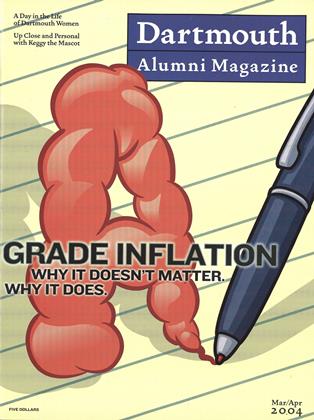QUOTE/UNQUOTE "The more educated you are, the more partisan you are, the less independently you think. Education leads away from independent thinking." NEW YORK TIMES COLUMNIST DAVID BROOKS, QUOTED IN THE DARTMOUTH DURING A JANUARY CAMPUS VISIT
OPPONENTS OF PROPOSED CHANGES to alumni governance rallied enough support at the December meeting of the Association of Alumni to forestall a new constitution favored by leaders of the association, the Alumni Council and the College administration. The meeting attracted 243 alumni on a snowy day.
The most contentious aspect of the proposed constitution—which garnered a simple majority of the 239 votes cast but not the three-quarters majority required- would have merged the now separate 96-member council with the association that represents the more than 60,000 people who once attended or graduated from Dartmouth. The council would also have been expanded from 96 to 122 members, primarily by expanding the representation of classes and affiliated groups. Instead of one rep for every two pre-50th reunion classes, there would have been a rep for each class; instead of one rep for all post-55th reunion classes, there would have been five for all post-50th reunion classes; instead of one rep for each affinity group there would have been two. Also under the proposed constitution, there would have been 18 at-large council members, six elected each year by all alumni rather than seven elected each year by the council, and a new provision for petitioners. (A comparison of current and proposed constitutions can be found at http://dartmouth.org/ council/jointcomm.html.)
"[Expanded representation] can only be to the betterment of the College," says association president Mike McClintock '80, who headed the slate of incumbent officers re-elected over petitioners. Under the proposed constitution, drafted by a joint committee of council and association members, officers elected to govern the council would take on the same titles for the association, which would continue to convene annually. The council would convey to the College concerns articulated at the association meeting.
At stake, said alumni who opposed the proposal, was whether the council would represent the entire alumni body or reduce it to observer status.
Bill Hutchinson '76, an advocate of governance reform but an opponent of the proposed constitution, says the expanded number of elected at-large council members is an important, positive step but still leaves the association without adequate representation because the council is largely appointed. While many classes—as well as clubs—historically have appointed rather than elected their council representatives, the proposed constitution urges elections.
The process to determine next steps is already under way. McClintock and Bill Dean '89, president of the council, plan to form a committee that would bring council, association and opposition points of view to bear on further constitutional revisions. "We'll strengthen the document and vote on it over the fall and winter," says Dean. "With an association that dates back to 1854, we are conscious that this is a matter of some gravity. We want people looking back years from now to see that our decisions were wise," says McClintock. "I hope the momentum for reform continues, with as many interested people involved as possible," says Hutchinson.
Straight Talk Ricki Fairley-Brown '78 (left)spoke of shared passions; Joe Smith '48questioned the treatment of petitioners.
 View Full Issue
View Full Issue
More From This Issue
-
 Cover Story
Cover StoryA is for Abundance
March | April 2004 By RICK GREEN -
 Feature
FeatureA Day in the Life
March | April 2004 By JONI COLE, MALS ’95 -
 Feature
FeatureBest in Show
March | April 2004 By Lisa Furlong and Lauren Gee ’03 -
 Article
ArticleSeen & Heard
March | April 2004 By MIKE MAHONEY '92 -
 Faculty Opinion
Faculty OpinionSaturate, Don’t Isolate
March | April 2004 By David C. Kang -
 From the Dean
From the DeanThe Fourth ‘R’
March | April 2004 By Michael S. Gazzaniga ’61







